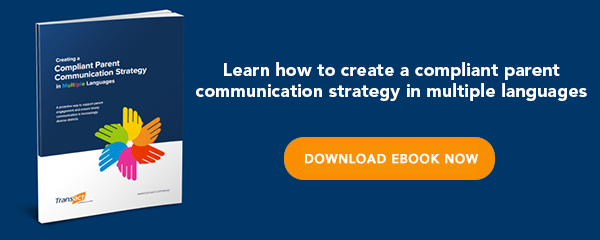As part of our commitment to provide school district administrators with resources and guidance on federal program compliance and administration, we regularly publish blogs featuring guest writers. We are honored to feature Scott Nyary, the EL Coordinator, Lead ESL Teacher and Title III Coordinator for Lamar County School District located near Hattiesburg, Mississippi discussing his observations following the announcement that the Deferred Action for Childhood Arrivals program has been rescinded:
Read MoreSchools, DACA, and Increased Anxiety Among Immigrants
Migrant Education Programs Under ESSA
As part of our commitment to provide school district administrators with resources and guidance on federal program compliance and administration, we regularly publish blogs featuring guest writers. We are honored to feature David Nieto of the BUENO Center for Multicultural Education, writing about changes to migrant education programs under the Elementary and Secondary Education Act (ESEA) as amended by ESSA.
Read MoreData Collection Made Easy: ActPoint KPI Simple Survey
ActPoint KPI is a data intelligence tool that school district business and operations leaders around the country use to measure, compare and manage their performance on over 500 Key Performance Indicators related to Finance, Operations, Information Technology and Human Resources.
Read MoreCost Reduction in Accounts Payable: Key Performance Indicators in School District Operations
Key Performance Indicators (KPIs) are defined as "a quantifiable measure that is used to evaluate the success of an organization or of a particular activity (such as projects, programs, products and other initiatives) in which it engages." When applied effectively throughout an organization, KPI analysis provides valuable information about strengths and weaknesses in performance which can lead to cost savings and improved performance.
Read MoreUSED Rescinds More Guidance Documents
I recently wrote a blog about the U.S. Department of Education’s (USED) announcement that the offices at USED that handle special education issues had identified for rescission 72 special education regulations and guidance documents. I included information about the immediate outcry from special education advocates and political adversaries of Betsy DeVos, the U.S. Secretary of Education, and how that resulted in the list of documents that were rescinded being reposted to the USED website, this time with an explanation for why each document was selected for removal. Following on the heals of the rescission of the special education documents comes the announcement of the rescission of nearly 500 more documents from other USED offices, including the Office of Elementary and Secondary Education (OESE) and the Office of Postsecondary Education (OPE).
Read MoreUSED Rescinds 72 Special Education Guidance Documents
In July 2017 I wrote a blog about the U.S. Department of Education (USED) requesting comments on regulatory reform. The reason for the USED action is Trump’s executive order requiring each federal agency to establish a Regulatory Reform Task Force to evaluate existing regulations and make recommendations regarding their repeal, replacement, or modification.
Read MoreESSA RoadMaps: What You Need to Know for ESSA Compliance
TransACT RoadMaps are a compliance and guidance component of TransACT Parent Notices subscriptions that existing subscribers can access at any time. RoadMaps use a series of yes/no questions to guide educators through the process of determining which parent notices are required to send out in a particular time period or situation. This helps educators to create a list of notices they need based on the unique characteristics of their school and/or school district. RoadMaps are a helpful, time-saving compliance tool for:
Read MoreUSED Regulation Review Targets Student and Parent Rights under FERPA
In July 2017 I wrote a blog about the U.S. Department of Education (USED) requesting comments on regulatory reform. The reason for the USED action is Trump’s executive order requiring each federal agency to establish a Regulatory Reform Task Force to evaluate existing regulations and make recommendations regarding their repeal, replacement, or modification.
Read MorePerformance Reports for School District Operations
For the past decade, district operations leaders have shown that measuring and analyzing the performance of district operations can help create a high-performing, efficiently operating district that directly impacts student achievement. While there are any number of items a district operations leader can measure within their district, a focus on analyzing rigorous and proven Key Performance Indicators (KPIs) in areas such as transportation, food services, maintenance, and business services departments across the district is proving to be pivotal in meeting the mission to cut costs and positively impact student outcomes. The Council of Great City Schools (CGCS) has developed a framework and an annual report to support operations leaders across the country in adopting KPI analysis in their districts.
Read MoreESSA State Plan Submissions: 4 States Receive Deadline Extension
If a State wants funding that comes through the Elementary and Secondary Education Act, as amended by the Every Student Succeeds Act (ESEA/ESSA), then it must submit an "ESSA State Plan" that describes how it will use that funding to benefit students in that State. The two deadlines to submit ESSA State Plans were April 3, 2017 and September 18, 2017, but not all states have submitted their plans.
Read MorePOSTS BY TOPIC
- ESSA (107)
- Parent Engagement (69)
- EL (59)
- Civil Rights (43)
- USED (19)
- KPI (15)
- Operations Performance (12)
- McKinney-Vento (10)
- Transportation (7)
- charter schools (5)
- compliance software (5)
- homelessness (4)
- ARP (3)
- American Rescue Plan (3)
- CARES Act (3)
- CRRSA (3)
- Corporate/Product News (3)
- ESSER (3)
- Education (3)
- HIMSS (3)
- Native American Education (3)
- Student Support (3)
- After School Programs (2)
- CGCS (2)
- COVID (2)
- CRRSA Act (2)
- Charter School Governance Platform (2)
- Charter School Leaders (2)
- OST (2)
- School Communication Plan (2)
- Student Success (2)
- Substitute Teacher Training (2)
- 21CCLC (1)
- AI (1)
- Artificial Intelligence (1)
- Board Meetings (1)
- Cloud Technologies (1)
- DACA (1)
- Data Compliance (1)
- Release Notes (1)
- Routing (1)
- charter board ceo (1)
- charter school staff (1)



